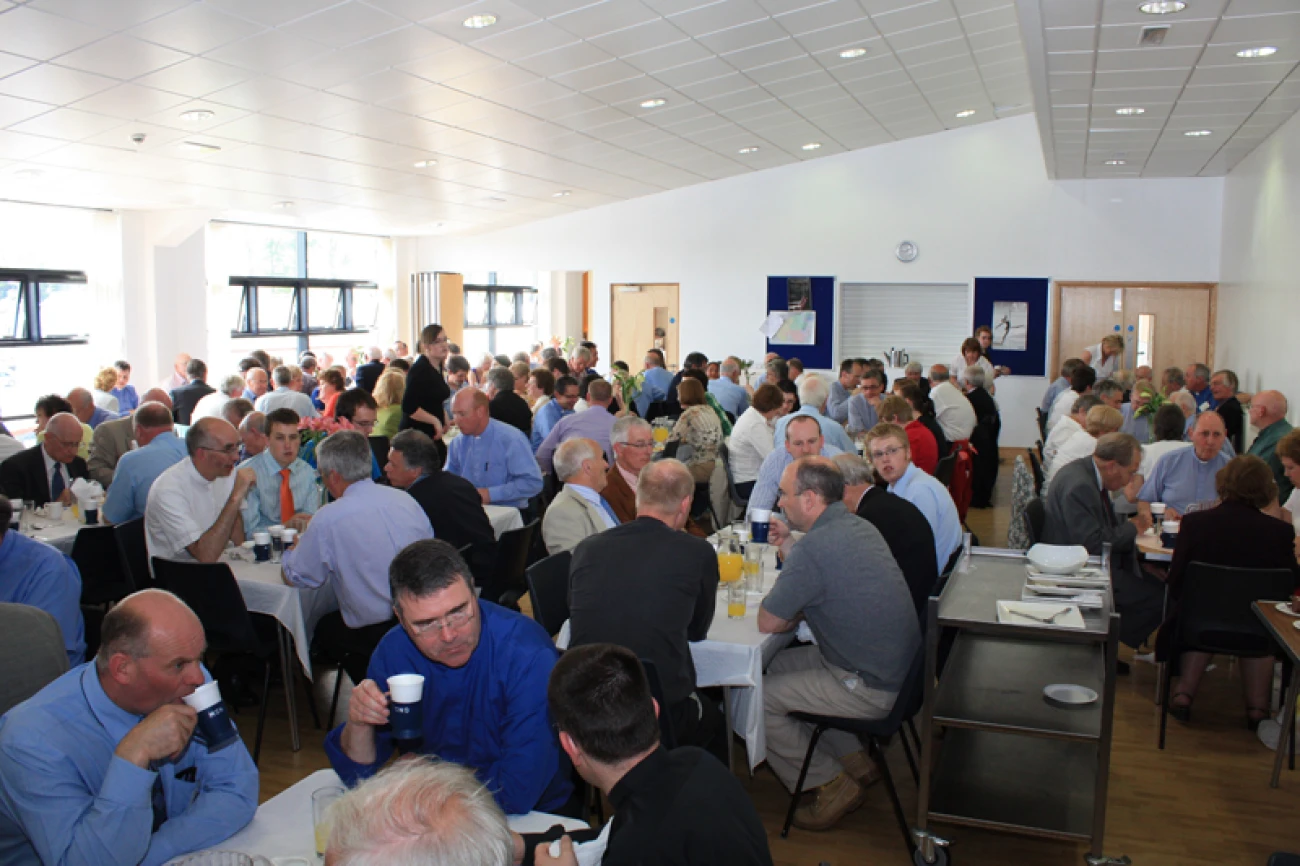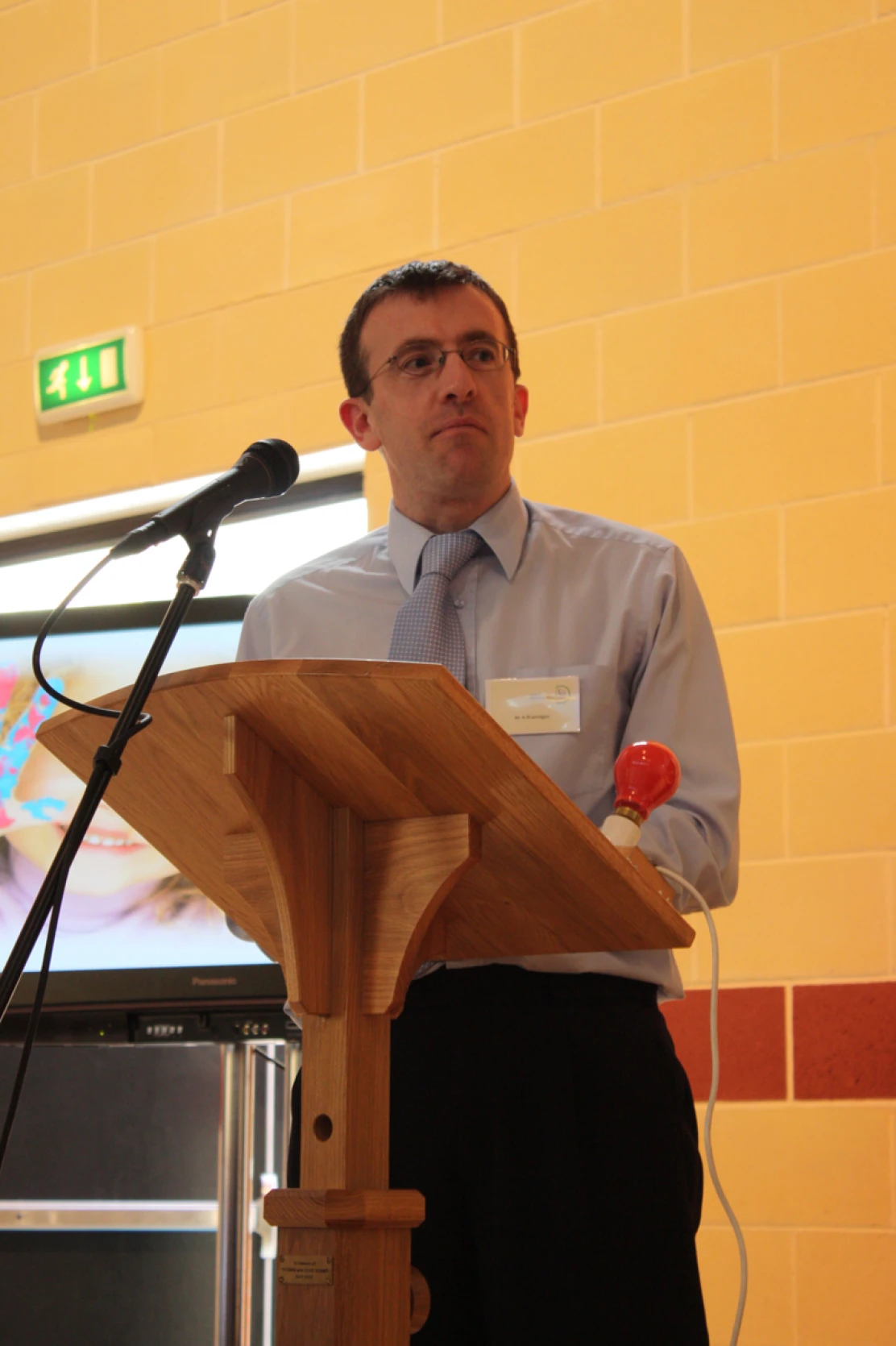An energising and important Synod

It was Bishop Harold Miller's closing remarks that were the most telling at this year's Down and Dromore Diocesan Synod on 23rd June. Commenting that the day had far exceeded his expectations, the Bishop said that it had been "an energising Synod and a very important one in the life of the diocese."
This was the first year in which more, younger, members have been integrated into Synod and that move undoubtedly made the event more engaging and vibrant. In another first, the pre-Synod service of Holy Communion was a Methodist form conducted by the Rev. Donald P Ker, President of the Methodist Church. The music was led by Carl McCambley and members of the Shankill Parish worship team.
It was one of the best attended Synods in recent years with over 350 members filling the main hall at The Jethro Centre in Lurgan. The Bishop began his Presidential Address by encouraging the Synod that "we are a Resurrection people, who understand that the Lord uses the most devastating and traumatic of times to reveal his glory and reaffirm his love."

Bishop Harold highlighted three anniversaries in 2009: The 400th Anniversary of the Charter of Down and Dromore Cathedrals, The 150th Anniversary of the Ulster Revival and The Fortieth Anniversary of the Present Troubles.
The Synod viewed a video of St Patrick's Day 2009, which shared something of the atmosphere of the day which began the 400th Charter Celebrations. In speaking of the interior work needed in both Down and Dromore Cathedrals, Bishop Harold announced a "target of honour" requesting that the parishes of the diocese give 1% of their total income for the next five years to a cathedral fund.
Turning to The 150th Anniversary of the Ulster Revival, Bishop Harold noted that the Synod was being held in Shankill, Lurgan, a parish which was utterly transformed by the 1859 Revival. He urged the diocese to, in its business, "reintegrate, with the anointing of God, the spiritual aspects of our life."
The Bishop said that the third anniversary, the Fortieth Anniversary of the Present Troubles is one that he had heard little mentioned but one he believed to be important: "Forty years is an important time-frame in the scriptures," he said. "It is a generation. It is a long period of time, like that in the wilderness, and it brings a sense of completeness. Now something fully new begins. This is an anniversary to celebrate by determining to deal with our issues fully and fearlessly."

Bishop Harold finished his address with thanks to his personal staff, to the diocesan office and in particular to the outgoing Diocesan Secretary, Neill Wilson, who later this year will celebrate 35 years of his ‘ministry' in the post. The Bishop paid tribute saying,
"I did not want this Synod to pass without saying publically and personally how grateful I am to him for all the work he has done, in the name of the Lord and for the good of the Diocese of Down and Dromore."
Business in the afternoon included two presentations: an overview of the results of the Children's Ministry Survey by Andrew Brannigan and the work of Christians Against Poverty (CAP ) by Basil O'Mally and Hilary McClay.

Whilst acknowledging the good work among children in the diocese, the Children's Ministry survey highlighted the decline in Sunday School attendance over the last five years and the numbers of children now outside the diocesan population. In the following lively conversation, many came to the podium, including a significant number below the age of 30. The Rev Canon Norman Jardine, Chairman of the Down and Dromore Council for Mission, was last to speak and asked that the Diocesan Council "complete the job that was begun last year and provide funding for the post of a Children's Development Officer." The Bishop acknowledged that there was a groundswell of support for such an appointment and assured Synod that it would be regarded as a priority and fully explored by the Council.
Also arousing much interest and conversation was a presentation of the work of CAP which, working with local parishes, offers several ways in which churches can respond to the problem of personal debt. A first and inexpensive step is to run CAP Money, a simple money management course that can be used within the church or as a community outreach tool. There are now several people in the diocese trained to deliver CAP Money and two parishes are hoping to open CAP Centres in the next year. Bishop Harold endorsed CAP, noting that it had in 2008 and 2009 won the Sunday Times Award for "Best Small Company To Work For", and Rev Mark Harvey, Ballybeen, exorted Synod to "not see it as somebody else's job but as ours. Let's be bearers of hope to those who need it."

Before final business, Synod took time for a 'Conversation on the Work of God,' a Methodist tradition which gives opportunity for members to speak more personally and passionately about the ways in which they see the Spirit of God at work in their churches. This was an encouraging time and there was no shortage of participants, both clergy and lay.
In closing, Bishop Harold reflected on the structure of Synod and suggested that the Council might look at ways of encouraging conversation about the gospel issues that really concern us as a church. The Bishop thanked all who had worked to make the day a success, making special mention of the staff of The Jethro Centre and the people of Shankill Parish. Archdeacon John Scott then stood to thank the Bishop for his leadership and wished him health and strength to continue for many years to come.
Concluding a successful day Bishop Harold commented, "We have raised a lot of interesting and key missional questions and I think all of us go back, not just having attended a Synod but encouraged and keen to put some of those ideas into action."
Click here to see the Synod photo gallery
Click here to download the Bishop's Presidential Address as a PDF